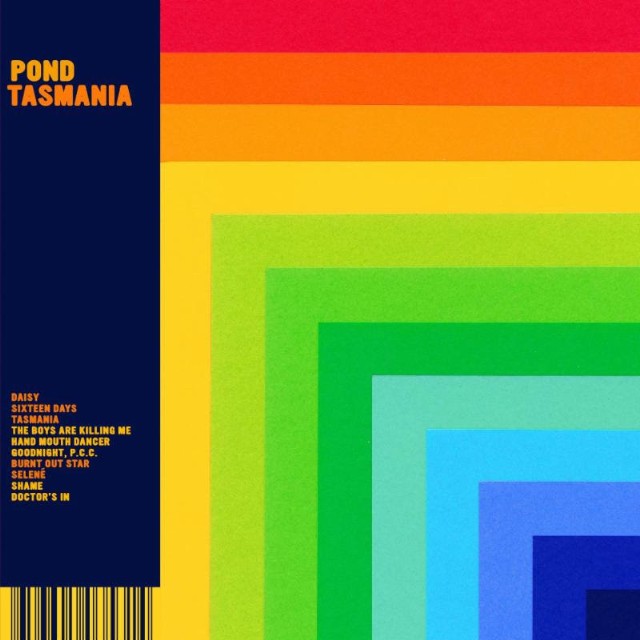“I might go and shack up in Tasmania before the ozone goes and Paris burns. And Australia, who knows?”. Two years after their satirical and amusing commentary on their home city of Perth and the world beyond, in which superficiality was confronted with harsh realities, prolific Australian psychedelic rock band Pond have global warming on their minds this time. It’s a universal issue of course, but like their previous albums Pond are focusing foremost on the impact it will have on their home country, as last December’s 49.3C heat record and recent flooding over the years have caused the band to worry about the impending environmental doom.
Lead singer Nic Albrook was acquainted with an environmental scientist a while back who showed him an ominous temperature projection chart of Australia in the next century. The last place to be habitable before complete destruction is Tasmania. This colour-coded graphic explains the record’s album cover, title and starting point for the album’s concept. Pond’s eight album Tasmania is an intoxicating and realistic collection of the kind of thoughts one would have when attempting to digest an apocalyptic future. For reference, think of the hysteria surrounding the characters in Lars Von Trier’s Armageddon-facing film Melancholia.
The first mental state described is panic. You wouldn’t know immediately by its juxtaposing semi-seductive 1970’s psychedelic soul vibe, but the character on the title track ‘Tasmania’ is in a state of impulsive alarm. He’s left his “phone in Sydney, so stressed out”, pleads that he wants to “breathe real air again”, is worried about war and plans to “shack up” in the Tasmanian region before the “o-zone burns”.
These kind of thoughts are also shared in the eight-minute galaxy-gazing prog epic and forebodingly-titled ‘Burnt Out Star’. On one of Pond’s smartest compositions, he confronts the apocalypse like an evil villain destroying a romance: “Perfect body that they’ll never tear apart. First they’ll have to tear my head from your heart.” Almost personifying the stars with the lines: “Burn out star, no matter where you are. Try to understand who you are”, as listeners hear sounds that resemble shooting stars. It’s also worth noting that Albrook also mentions stars on the fuzzy David Bowie-stylized lullaby ‘Goodnight P.C.C’ as being the birthplace of all humans, as yearns to return there.
The next reaction from writer Nic Albrook is nostalgia and hindsight. He thinks about the past and whether he truly appreciated those moments. On opener ‘Daisy’ he thinks about his childhood growing up in the Kimberly region of Western Australia, an area known his sparse population and rare flora, which attracts tourists worldwide. He adheres to this beauty when mentioning cherry blossoms and frangipanis. The esoteric name-dropping of friends and family make this a very personal narration of his, while the haunting string sections that bookend the shimmering indie-pop elements of the song (perhaps representing the impending destruction) threaten to dissolve this golden rather fond memory.
Different kinds of regret are felt on the Daft Punk-reminiscent electronic funk ‘Sixteen Days’ and fascinating ballad ‘Shame – the latter’s flickering, sparking yet imploding environment fascinatingly springs to mind Björk’s 1997 also envriomentally-themed record Homogenic.
‘Sixteen Days’ is about a romantic affair the singer had in Genoa, Italy – confusingly it features French lyrics. Rather than embrace the time he had with his lover, the experience was filled with jealous anxieties that evolved into clinginess, an irrational obsession with the possibility of other male attention, desperation and eventually madness. While penultimate track ‘Shame’ could be interpreted as a symbolic apology to the planet for humanity’s carelessness, especially when it’s coincided with the finale ‘Doctor’s In’ which sounds like the apocalypse is already taking place with it’s increasingly suffocating bashed percussion.
Although it lacks the humour and playful culture-poking of its predecessor The Weather and its regular use of voice decoders does occasionally blur out potentially meaningful lyrics which could add weight to the concept, on the whole Tasmania is an incredibly well-produced sonic experience.
Once again ex-Pond drummer and Tame Impala mastermind Kevin Parker oversees production. He brings such creative textures to proceedings that this one of those albums best enjoyed independently on headphones, especially for its numerous moments of ear-pleasuring psychedelic-jamming, effervescent phasing techniques and celestial atmosphere. One that takes listeners temporarily on a flying journey through the galaxies. Both an ephemeral departure from the climate change problems at home and a belated appreciation of the beauty that surrounds us.
Tasmania is released on 1st March through Spinning Top.




